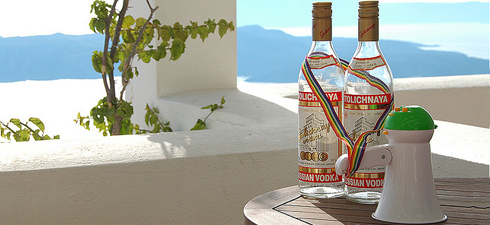Ultra-nationalist Vladimir Zhirinovsky should be pleased. His prophecy, announced shortly after the collapse of the Soviet bloc, that the day when “Russians would wash their boots in warm seas” was near at hand, appears to be coming true. But this Tsarist dream of an empire that extends from the Mediterranean to the Indian ocean will not be realised by force of arms, but rather by tourist flows.
With his offer of a range of luxury holiday homes on the Kassandra Peninsula [southeast of Thessaloniki], entrepreneur Sergei Fentorov, a member of the Moscow Chamber of Commerce and Industry and a former nuclear submarine lieutenant, is already part of this dream.
And he is not alone. Just opposite, on the Sithonia Peninsula, the villa nestling amid four hectares of pine covered hills with a remarkable view on Mount Athos apparently belongs to Prosecutor General Yury Chaika, Russia’s second most powerful man after Vladimir Putin.
Bargains at prices that are undervalued 30%
More and more rich Russians are buying up second homes in the Halkidiki [region of Northern Greece], while Russian companies are purchasing hotels and investing in land. No one knows exactly how much they have already bought.
But it appears that Russians are already the owners of a major hotel development in Potidaea and another in Psakoudia, and that they aim to participate in a call for tender for a major hotel in Gerakini. At the same time, they are partners in a joint venture with a Greek company to build a further 600-bed hotel in the region.
A Russian company is also involved in the purchase 4,200 hectares in Sithonia, which is to provide the location for a five-star hotel, at a time when Russian interests control the quasi-totality of the surging tourist flows from former Soviet bloc countries.
“Usually, they are looking to buy bargains at prices that are undervalued 30%,” explains Gregoris Tassios, the President of the Halkidiki Hoteliers Union. “They invest in land, luxury villas and hotels. They have already acquired eight to ten hotels.”
“I don’t think Russia has a relationship with any other country in the world which is the same as the one it has with Greece,” explains Terenty Meshcheryakov, a member of the Saint-Petersburg regional government. This the reason why they are investing in real estate everywhere, and not just in Halkidiki.
Northern Greece being kept alive by the Balkans
Russian investors are taking an interest in islands like Crete, Corfu and Patmos. Russian funds have already bought the Thessaloniki football club P.A.O.K, and shown an interest in the national rail company OSE. In the business world, it is rumored that they may be hoping to acquire a port in Northern Greece, especially Thessaloniki, within the framework of the country’s privatisation programme. This would spare them the exorbitantly expensive nightmare of shipping through the Dardanelles Strait, which is mainly controlled by the Turks [ even though it is classed as international waters].
The Russians may not be the only ones undertaking massive investment in tourism in Northern Greece, the “Pearl of the Northern Aegean” has also attracted attention from investors in Balkan countries who are increasingly buying houses and small hotels, and sending more and more tourists to the region.
For example, Bulgarian President Rosen Plevneliev owns a chalet in Ouranopoli, former Macedonian prime minister Vlado Bučkovski has a home in Neos Marmaras, and a number of Serbian and Albanian government representatives have also acquired residences in the area. “We will have to take into account the fact that here, in Northern Greece, tourism and the general economy are being kept alive by the Balkans,” says a local hotelier.
Do you like our work?
Help multilingual European journalism to thrive, without ads or paywalls. Your one-off or regular support will keep our newsroom independent. Thank you!












